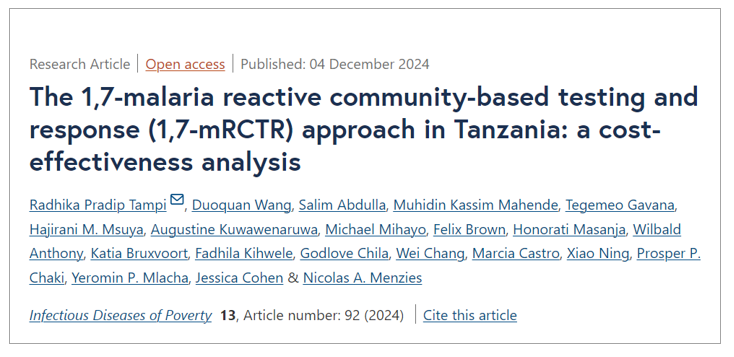
GROUNDBREAKING: Study finds proven Chinese malaria control strategy cost-effective in Africa

A groundbreaking study by Ifakara Health Institute and partners, published on the Infectious Diseases of Poverty journal, has demonstrated that a modified malaria control strategy, known as the 1,7-mRCTR intervention, is both effective and cost-efficient in reducing malaria transmission in moderate-to-high transmission settings in Tanzania.
What is Reactive Case Detection (RACD)?
Reactive Case Detection (RACD) is a targeted malaria control strategy where detecting a malaria case triggers screening and treatment of individuals living nearby. This approach has been highly effective in low transmission settings but remained largely untested in moderate-to-high transmission areas.
The study, conducted from 2019 to 2021 in Tanzania’s Kilwa, Kibiti, and Rufiji districts, evaluated the economic and health impact of the 1,7-mRCTR intervention compared to standard passive case detection. The modified strategy combines reactive and passive detection to better target malaria hotspots.
RACD cost-effectiveness
The intervention cost $5,327 per 1,000 people, detecting an additional 445 malaria cases per 1,000 compared to passive detection alone. The incremental cost per additional case detected was $12. That means, for every 1% decline in malaria prevalence, the intervention averted 95.2 malaria cases and 0.04 deaths per 1,000 people. On average, it averted 19.1 disability-adjusted life years (DALYs) per 1,000 population.
With an incremental cost-effectiveness ratio of $163 per DALY averted, the 1,7-mRCTR intervention proved cost-effective against Tanzania’s healthcare spending threshold of $417 per DALY.
Implications for malaria control
These findings suggest that the 1,7-mRCTR intervention could strengthen malaria control efforts in Tanzania and similar high-burden regions. By extending the proven RACD model to moderate-to-high transmission areas, policymakers can allocate resources more effectively to combat malaria.
The success of this study highlights the importance of adaptive malaria interventions tailored to different transmission settings. Expanding such evidence-based strategies could play a critical role in global malaria elimination efforts.
Who’s behind this study?
Contributors to this collaborative study represent some of the leading malaria research centres globally. They include the Ifakara Health Institute, Tanzania; Harvard University, USA; National Institute of Parasitic Diseases, China; Chinese Center for Disease Control and Prevention (Chinese Center for Tropical Diseases Research);
Others are: the WHO Collaborating Center for Tropical Diseases; the National Center for International Research On Tropical Diseases, China; Shanghai Jiao Tong University School of Medicine, China; Africa Academy for Public Health, Tanzania; University of Alabama at Birmingham, USA; World Bank Group, USA; and the Harvard T.H. Chan School of Public Health, USA.
Lead author is Radhika Pradip Tampi from Harvard University, Cambridge, MA, USA. Contributors from Ifakara include Prosper Chaki, Yeromin Mlacha, Salim Abdulla, Muhidin Mahende, Fadhila Kihwele, Godlove Chila, Tegemeo Gavana, Hajirani Msuya, Augustine Kuwawenaruwa, Michael Mihayo, Felix Brown, and Honorati Masanja.
In the list of contributors also are: Duoquan Wang and Xiao Ning from the National Institute of Parasitic Diseases, China; Wilbald Anthony from the Africa Academy for Public Health, Tanzania; Katia Bruxvoort from the School of Public Health, University of Alabama at Birmingham, Birmingham, AL, USA; Wei Chang from the World Bank Group, Washington, DC, USA; Marcia Castro, Jessica Cohen & Nicolas Menzies from the Department of Global Health and Population, Harvard T.H. Chan School of Public Health, Boston, MA, USA.
More: About Reactive case detection (RACD)
Reactive case detection (RACD) is a form of surveillance and response strategy in which a passively detected index case triggers the deployment of a local screen-and-treat response targeted at individuals living near the index case.
In China, the “1-3-7” strategy is a form of RACD that has been recognized as a core component of a highly successful national malaria elimination effort. This approach requires adherence to a strict timeline; malaria cases must be reported to the Chinese Information System for Disease Control and Prevention within one day, the case confirmed and investigated by the County CDC within three days, and foci response deployed by the County CDC within seven days, giving the model its “1-3-7” name.
Read the full research paper here.
